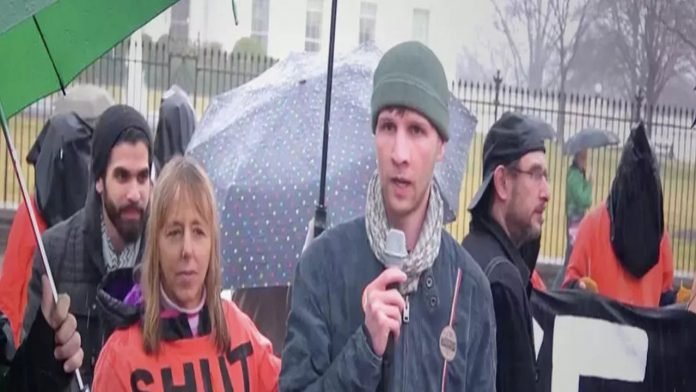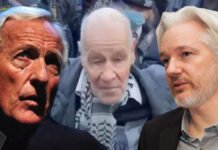
“In a time of deceit telling the truth is a revolutionary act.” ― George Orwell
Daniel Hale, 33, of Nashville, Tennessee, faced up to nine years in prison for leaking classified information about the U.S. drone and targeted assassination program. During his time in the Air Force from 2009 to 2013, Hale worked with the National Security Agency and the Joint Special Operations Task Force at the Bagram Air Base in Afghanistan, he was responsible for identifying, tracking, and targeting “high-value” terror suspects.
The following year, when he was assigned to the NSA, Hale began communicating with a journalist. In 2014, after Hale had been honorably discharged from the Air Force and started working at the National Geospatial-Intelligence Agency, he shared documents that contradicted the U.S. military’s claims that the drone assassination program could kill “enemy combatants” with precision and minimize civilian casualties.
In March, Hale pleaded guilty to one count of violating the World War I-era Espionage Act for leaking documents exposing the drone program.
In May 2019, Hale was charged under the Espionage Act for leaking secret documents to a reporter widely believed to be The Intercept‘s Jeremy Scahill.
“These documents detailed a secret, unaccountable process for targeting and killing people around the world, including U.S. citizens, through drone strikes,” Betsy Reed, editor-in-chief of The Intercept, said after Hale’s indictment. “They are of vital public importance, and activity related to their disclosure is protected by the First Amendment.”
According to journalist Kevin Gosztola, Hale’s whistleblowing enabled The Intercept to reveal that “nearly half of the people on the U.S. government’s widely shared database of terrorist suspects are not connected to any known terrorist group,” detail how assassination targets ended up on Obama’s “kill list,” and expose new information about Bilal el-Berjawi, a Briton “who was stripped of his citizenship before being killed in a U.S. drone strike in 2012.”
In a handwritten letter released last week, Hale explained that his decision to disclose top-secret information about the inner workings of U.S. drone warfare was motivated by guilt over his role in carrying out “gruesome” killings of defenseless people “from the cold comfort of a computer chair.”
I’m for truth, no matter who tells it. I’m for justice, no matter who it is for or against. I’m a human being, first and foremost, and as such I’m for whoever and whatever benefits humanity as a whole.
― MALCOLM X
Daniel Hale stood trial for realising the truth!
After yesterdays verdict Human rights and press freedom advocates expressed dismay after the whistleblower Hale, who had pled guilty earlier in the year to violating the Espionage Act, was sentenced to 45 months in prison for sharing with a journalist classified information about the U.S. military’s drone assassination program.
“This has been an odyssey that has occupied most of the better part of his adult life for basically committing the truth,” says Jesselyn Radack, an attorney for Daniel Hale. “The U.S. has never contested any of Daniel’s disclosures,” Radack adds. We also speak with Noor Mir, Daniel Hale’s close friend and part of his support team, who describes him as a compassionate person willing to make sacrifices to do the right thing. “I know that when he’s out, he will remain committed to ending suffering in all forms,” Mir says.
Hale’s lawyers argued in court papers that his humanitarian motives, and the lack of harm resulting from his actions, warranted a lenient sentence.
“He committed the offense to bring attention to what he believed to be immoral government conduct committed under the cloak of secrecy and contrary to public statements of then-President [Barack] Obama regarding the alleged precision of the United States military’s drone program,” wrote Defense attorneys Todd Richman and Cadence Mertz.
Prosecutors, however, claimed Hale’s leaks posed a greater risk to “national security” than those of Reality Winner, the former National Security Agency (NSA) whistleblower released last month after serving four years of a 63-month sentence—the longest ever imposed for disclosing classified government information to the media. They sought a sentence “significantly longer” than Winner’s.
U.S. District Judge Liam O’Grady said the 45-month prison sentence he gave Hale was necessary to “deter others from disclosing government secrets,” the Associated Press reported.
Edward Snowden, the American whistleblower who has lived in Russia with asylum protections since leaking classified materials on U.S. government mass surveillance in 2013, was among those who denounced the judge’s decision.
“Daniel Hale, one of the great American Whistleblowers, was just moments ago sentenced to four years in prison. His crime was telling this truth: 90% of those killed by US drones are bystanders, not the intended targets. He should have been given a medal.”
Daniel Hale, one of the great American Whistleblowers, was just moments ago sentenced to four years in prison. His crime was telling this truth: 90% of those killed by US drones are bystanders, not the intended targets.
— Edward Snowden (@Snowden) July 27, 2021
He should have been given a medal. https://t.co/3i4IbkrfI3
The Obama and Trump administrations both went to great lengths to prevent leaks and punish government officials for divulging information to reporters. Before former President Donald Trump launched a “war on whistleblowers,” the Department of Justice under Obama prosecuted nine leak cases, more than all previous administrations combined.
Last month, the Washington Post‘s publisher accused Biden’s Justice Department of exacerbating the Trump-era assault on press freedom, prompting the DOJ last week to prohibit prosecutors from using secret orders and subpoenas to obtain journalists’ phone and email records.
Nevertheless, Biden’s DOJ continued to prosecute Hale and is also still pursuing an espionage case against WikiLeaks founder Julian Assange that began under Trump.
The Espionage Act, a World War I-era law that criminalizes the disclosure of classified government information to unauthorized viewers, has been used on several occasions to punish whistleblowers, including Hale, Assange, Snowden, Winner, John Kiriakou, Chelsea Manning, Jeffrey Sterling, and others.
“A group of First Amendment and media law scholars wrote the court in support of Hale, calling him ‘a classic whistleblower, who acted in good faith to alert the public of secret government policies that deserved to be debated by the citizens in a truly functioning democracy,'” the Post reported. “They argue that the Espionage Act was intended to punish foreign spies, not those who seek to enlighten the American people.”
The ACLU echoed that message on Tuesday, stating that “leaks to [the] press in the public interest shouldn’t be prosecuted under the Espionage Act.”
“Daniel Hale helped the public learn about a lethal program that never should have been kept secret,” the organisation added. “He should be thanked, not sentenced as a spy.”
Democracy Now
“Committing the Truth”: Whistleblower Daniel Hale was Sentenced Tuesday for Drone Program Leaks.
Codepink
CodePink pointed out Tuesday, “no U.S. official who authorized the murder of civilians with drones has ever been held accountable.”
Daniel Hale will be sent to prison today for telling the truth about the US drone program.
— CODEPINK (@codepink) July 27, 2021
No US official who authorized the murder of civilians with drones has ever been held accountable. #FreeDanielHale pic.twitter.com/ypRLmUkeEe
CodePink is spearheading a petition asking President Joe Biden—Obama’s vice president—to pardon Hale. The letter states that:
Daniel Hale is not a spy, a threat to society, or a bad faith actor. His revelations were not a threat to national security. If they were, the prosecution would be able to identify the harm caused directly from the information Hale made public.
While the courts have ruled that a defendant’s motive in a case related to the Espionage Act is irrelevant, we recognize that Hale’s motive was only to provide the American people with information about government misconduct. We believe that rather than harm our country, Hale’s revelations actually enhanced our democracy by providing critical information about what our government has been doing in our name. We also believe that Hale’s revelations help push our government to reassess its drone program in light of its violations of U.S. and international law.
First Amendment advocates have long argued that cracking down on journalists and their sources dissuades people from sharing information that can help expose the truth, hold the powerful accountable, and improve the common good.
Support Independent Journalism Today
Our unwavering dedication is to provide you with unbiased news, diverse perspectives, and insightful opinions. We're on a mission to ensure that those in positions of power are held accountable for their actions, but we can't do it alone. Labour Heartlands is primarily funded by me, Paul Knaggs, and by the generous contributions of readers like you. Your donations keep us going and help us uphold the principles of independent journalism. Join us in our quest for truth, transparency, and accountability – donate today and be a part of our mission!
Like everyone else, we're facing challenges, and we need your help to stay online and continue providing crucial journalism. Every contribution, no matter how small, goes a long way in helping us thrive. By becoming one of our donors, you become a vital part of our mission to uncover the truth and uphold the values of democracy.
While we maintain our independence from political affiliations, we stand united against corruption, injustice, and the erosion of free speech, truth, and democracy. We believe in the power of accurate information in a democracy, and we consider facts non-negotiable.
Your support, no matter the amount, can make a significant impact. Together, we can make a difference and continue our journey toward a more informed and just society.
Thank you for supporting Labour Heartlands











